At Least 40 Filmmakers Arrested Amid Protests In Iran: Activist
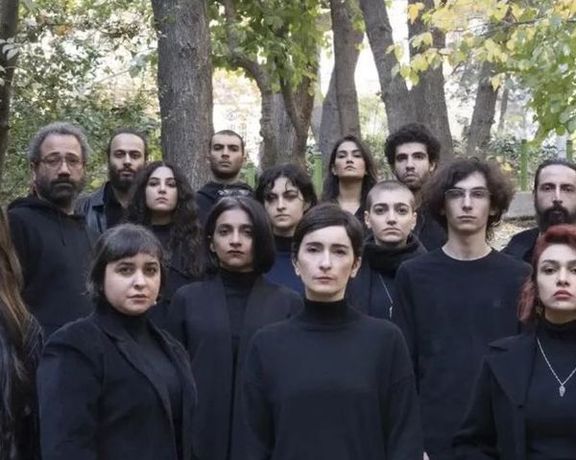
A member of the Committee to Follow up on Situation of Arrested Artists says at least 40 filmmakers have been detained during the national uprising against the Islamic Republic.

A member of the Committee to Follow up on Situation of Arrested Artists says at least 40 filmmakers have been detained during the national uprising against the Islamic Republic.
In an interview with Shargh daily on Saturday, Mehdi Kouhian said around 150 cinema figures have been summoned, arrested, accused, banned from leaving the country or persecuted in various ways by the regime during the recent protests.
He added that most of the detainees are "lesser-known figures whose families have not announced their names yet.”
To protect their privacy, said Kouhian, as long as their families do not reveal their identities, “we will not release the names of the incarcerated artists.”
According to Kouhian, the members of the committee met November 30 with one of the judiciary officials to call for the release of the arrested, and the official was also “very optimistic that the current situation will change, but within the past few days, another artist was apprehended.”
Kouhian was talking about famous cinema star Mitra Hajjar who was arrested for some hours recently.
Previously, Katayoun Riahi and Hengameh Qaziani, two other actresses, were arrested after posting their pictures without the mandatory hijab in solidarity with women who have been leading the antigovernment protests. However, they were later released on bail.
Toomaj Salehi and Emad Qavidel, the rap singers as well as some other directors and actors like Soheila Golestani and Hamid Pour Azari are still in custody.

Iran has executed four individuals and sentenced three others accused of working for Israel’s Mossad intelligence agency and conducting kidnappings.
According to the official news website of the judiciary, Mizan Online, the four Iranians, identified as Hossein Ordoukhanzadeh, Shaahin Imani Mahmoudabad, Milad Ashrafi Atbatan, and Manouchehr Shahbandi Bojandi, were hanged early on Sunday. Ordoukhanzadeh – the alleged main link with Mossad – had been imprisoned in Greece between 2014 and 2017 for attempting to traffic humans from Turkey to Greece.
“This morning, the sentences of four main members of the gang of mobsters related to the Zionist intelligence service were executed,” read a statement by the judiciary, adding that their sentences were carried out four days after the Islamic Republic’s supreme court upheld the penalty of capital punishment for “their intelligence cooperation with the Zionist regime [Israel] and kidnapping.” There was no recourse to appeal after the decision on Wednesday, November 30, it added.

According to the Wednesday ruling, three other defendants were sentenced to between five and 10 years in prison for crimes against the Islamic Republic’s security, complicity in kidnapping and possession of weapons.
All the seven individuals – whom the judiciary called “thugs” with previous criminal records -- allegedly received payment in cryptocurrencies and were guided by Israeli intelligence to buy weapons and equipment, do the abductions and interrogating them, engage in destroying public and private property, theft, kidnappings, and obtaining fake confessions. They allegedly received their instructions from a Mossad operative based in Sweden. They also received training on how to destroy evidence, evade security cameras, and swap vehicles, the judiciary claimed.
Iran’s state media claimed that the group was behind the kidnapping and interrogation of Iranian "jihadist" Yadollah Khedmati.
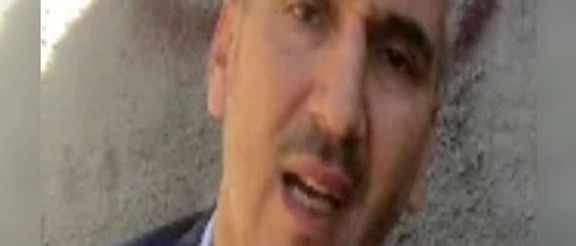
In July, Iran International obtained video footage of an interrogation in which a man introducing himself as Yadollah Khedmati, deputy commander of the Revolutionary Guards (IRGC) Logistics, says he regrets his involvement in shipping weapons to Iran’s proxy groups in Syria, Iraq, Lebanon, and Yemen and urges other IRGC officials to avoid engagement in such activities.
According to a source, Khedmati served as the deputy of Brigadier General Ali Asghar Nowrouzi, the IRGC’s Logistics commander who is known as a close associate of the former commander of the IRGC’s Qods Force, Ghasem Soleimani. Soleimani was assassinated by the US in Baghdad in January 2020.
Khedmati also tells his interrogators about Nowrouzi’s connections with Fars Air Qeshm cargo airline. The airline has been accused of transporting weapons for Hezbollah during the civil war in Syria.
In another case, Israeli media had published a short video in which a man identified as Mansour Rasouli said he was sent to Turkey by the Revolutionary Guards (IRGC) to establish an operational network, assassinate an Israeli diplomat in Istanbul, a Germany-based US general, and a journalist in France.
The audio recording surfaced hours after Iran International's report of the alleged Iranian triple assassination plot. Israeli television channels including Channel 12 which broadcast the recording, without providing a source according to The Times of Israel, claimed it was made by Mossad operatives posing as Iranian secret service at Rasouli's home in Tehran but did not hold him after the interrogation. In another video aired by Iran International in May, Rasouli said he was abducted and coerced to make false confessions.
Factual corrections were made in this report on June 15, 2023
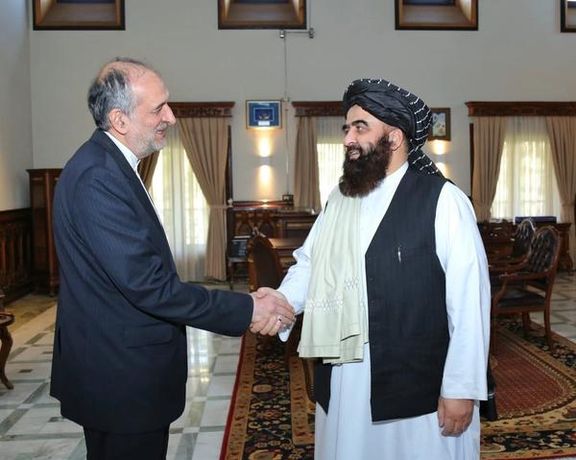
Iran's ambassador to Afghanistan believes that the Taliban group is a disaster for Afghanistan, the region and the world, but Iran has no choice but to use this opportunity “to civilize them.”
The comments by Bahador Aminian were published after the hacktivist group Black Reward got access to IRGC-affiliated Fars News Agency database last month.
However, Iran’s embassy in Kabul denied the statements and described it as a conspiracy to create crisis in the region.
After explaining the nature of the Taliban as well as the problems the Islamic Republic has with the group, the Iranian ambassador is quoted as saying, “We have no choice but to side with the Taliban and make use of them.”
He believes that the Taliban, despite having fought against the United States for two decades, are not anti-American, and if the Islamic Republic is slow to move, “the Americans can easily seize them.”
In another part of the file, Aminian says he is worried that Supreme Leader Ali Khamenei has the fewest followers in Afghanistan and “most of the Shias in Afghanistan are followers of Ayatollah Sistani and others.”
Aminian also talks about the water dispute between Tehran and Kabul, saying that the Taliban have said, “We must not give even a drop of water to Iran”.
Iran has been accusing Afghanistan of holding the water from the Hirmand River by constructing a series of dams.
He also states that generally Iranians’ view of Afghans is a racist and humiliating one.
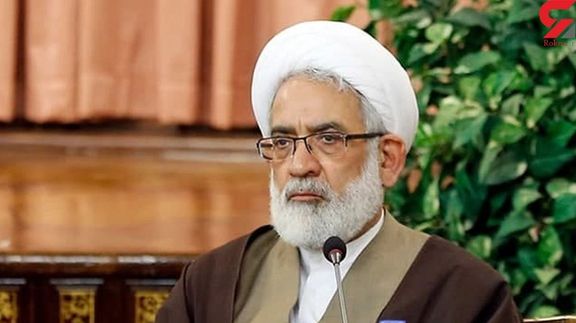
Iran's Prosecutor General says although he has always supported limiting access to the Internet, he has concluded that this kind of censorship is not effective.
Mohammad Jafar Montazeri said while explaining what he called "the hybrid war in recent riots, "December 1 that Iranians use various Virtual Private Networks (VPN) to circumvent government Internet filters.
"We shut down one VPN today and immediately it is replaced by another one supplied by foreign countries." He added that "The only solution is shutting down the Internet completely, which is neither possible, nor the officials want this to happen."
Although he blamed foreign countries for providing VPNs, it is local businesses, most controlled by people close to the regime who sell the software.
Montazeri said he has been criticized by Internet users for insisting on blocking websites and application, but previous government disobeyed Supreme Leader Ali Khamenei's order about strictly controlling the Internet.
He made the comment mindless of the fact that one of President Ebrahim Raisi’s main promises in the 2021 presidential election was giving access to high-speed Internet to all Iranians in a bid to boost business.
Montazeri said that “enemies” have tried all sorts of campaigns against the Islamic Republic during the past four decades. Today, he said, they have resorted to a hybrid war.
The term has become a buzz word of Iranian officials and military commanders who have been repeating Khamenei's words probably without fully understanding it. Montazeri added that "the main perpetrators of this hybrid war are Israelis, Americans, Germans and the French."
He explained that this hybrid war consists of political cyber campaigns, fake news and diplomatic actions, adding that Khamenei had particularly warned about the cultural aspect of this war many years ago, but officials did not take his warning seriously.
A report published by proreform Fararu news website indicated that up to 10 million Iranians' livelihood may be adversely affected by government’s Internet access denials and its ban on social media platfoems. This has prevented Internet-based businesses from marketing and selling their products and services. Economists told Fararu that the limitation will have alarming repercussions for Iran's economy while the country is suffering from high inflation and recession.
Fararu added that only during the past two months while the protests were raging on, Iranians lost up to 300 thousand jobs as a result of the restrictions imposed on the Internet. Some 53 percent of Internet-related businesses have been losing some 500 million rials ($1,500) per day each. According to the trade union of computer-based businesses, Instagram has a penetration rate of 80 percent in the market with some 3.5 million jobs depending on the platform.
Economist Ehsan Soltani warned that "the officials do not want to listen to this problem. They do not realize that filtering and slowing down the Internet will add to economic problems. They keep adding to the country's problems by insisting on their mistakes."
The government has been severely restricting Internet access in general and access to popular social media platforms, such as Instagram, that play a key role in e-commerce. The government is extremely nervous that people use the Internet and social media to share news and images about protests, possibly motivating a larger segment of the population to join demonstrations.
Earlier this year, several US lawmakers and former US official Victoria Coates, who served as senior advisor to the energy secretary in the Trump administration, called on entrepreneur Elon Musk to activate Starlink satellite access for Iranians. Reports on social media during September and October said that private entities have smuggled Starlink reception equipment into Iran. But there is still no substantial indication how widespread Starlink’s use is.
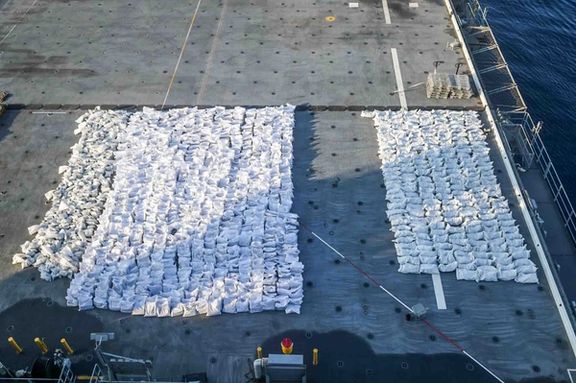
The US Navy has intercepted a fishing trawler smuggling over 50 tons of ammunition, fuses and propellants for rockets in the Gulf of Oman on its way from Iran to Yemen.
The Bahrain-based United States Fifth Fleet said in a statement Saturday that it was the “second major illegal weapons seizure within a month" along the maritime route.
“This significant interdiction clearly shows that Iran’s unlawful transfer of lethal aid and destabilizing behavior continues,” said Vice Adm. Brad Cooper, commander of US Naval Forces Central Command.
“US naval forces remain focused on deterring and disrupting dangerous and irresponsible maritime activity in the region,” he underlined.
The statement also said that the fishing trawler, intercepted Thursday, was transporting “nearly 7,000 rocket fuses and over 2,100 kilograms of propellant used to launch rocket propelled grenades.”
“The direct or indirect supply, sale or transfer of weapons to the Houthis in Yemen violates UN Security Council Resolution 2216 and international law,” added the statement.
Last month the US navy said it had scuttled a vessel carrying “explosive materials” from Iran to supply the Houthis, with enough power to fuel a dozen ballistic rockets.
The Houthis receive military and political support from Iran in their conflict with other Yemenis, who have been backed by a Saudi-led coalition since 2014. Iran has been sharing its missile and drone technology with Yemen’s Houthis and has also supplied other proxy forces, such as the Lebanese Hezbollah and Iraqi Shiite militias.
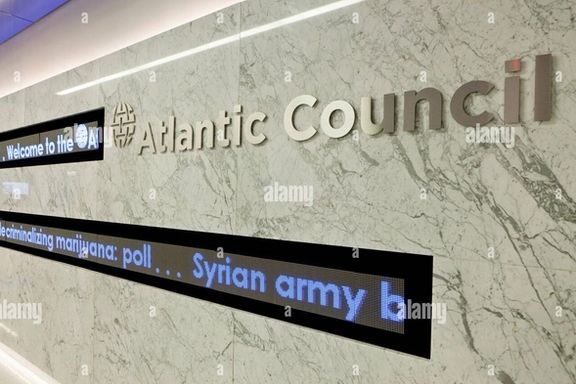
The Atlantic Council, a leading Washington think-tank, this week announced a new forum to debate the future of Iran and offer policy recommendations.
In a press release December 2, the council said the ‘Iran Strategy Project’ reflected “the unprecedented level of discord and uncertainty in Iran” and was “driven by recent events,” including the “women-led Iranian social movement demanding freedom and autonomy, the near-term potential for a new Supreme Leader, Iran’s evolving role in the region…and the likely end of the Joint Comprehensive Plan of Action (JCPOA).”
The council described the JCPOA – the 2015 Iran nuclear deal, which the US left in 2018 – as “the prism through which US and European policy toward Iran has been based for much of the past decade.”
Founded in 1961, the Atlantic Council stands broadly for a close relationship with Europe and a philosophy of ‘Atlanticism.’ This put it at odds with former president Donald Trump, who ignored European objections in withdrawing the US from the JCPOA and unleashing ‘maximum pressure’ sanctions against Iran. Former journalist Barbara Slavin, who led the Atlantic Council’s work on Iran and will shortly leave, was a prominent advocate of the JCPOA.
While President Joe Biden came to office in 2021 committed to reviving the JCPOA, 18-months of multilateral and bilateral talks saw Washington and Tehran failing to agree how to restore the 2015 agreement, leaving draconian sanctions in place and the Iranian nuclear program expanding. Recent protests in Iran, and Tehran’s military cooperation with Russia, have emboldened enthusiasts of ‘maximum pressure’ and put JCPOA supporters on the back foot.
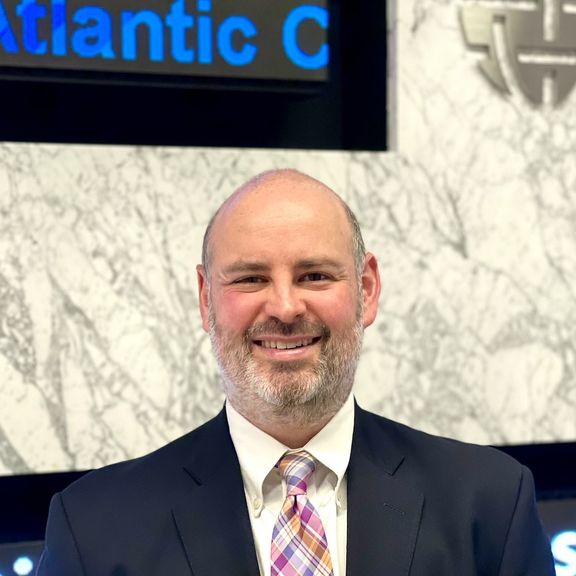
The ‘Iran Strategy Project’ will be led by Jonathan Panikoff, a former US intelligence officer, with an advisory board including General Frank McKenzie, former US commander in the Middle East, Michael Morell, former deputy director of the Central Intelligence Agency, and Stuart Levey, a banker who as US Treasury undersecretary 2004-11 was a major architect of the current sanctions regime.
Taking a ‘holistic look’
Also on the board will be Sanam Vakil of the Middle East and North Africa program at Chatham House, London, Rob Macaire, British ambassador to Iran 2018-21, Ladan Boroumand, founder of the Washington-based Boroumand Centre, and Marjan Keypour, director of the Alliance for Rights of Minorities and active supporter of Israel.
Panikoff said the project would take “a holistic look” at all issues relating to Iran – “political, human rights, security, economic, nuclear, social, and natural resources” – and that it would offer a “forum for experts across the political spectrum, and with varying functional expertise, to discuss and debate the future of Iran, and to provide concrete strategic options for policymakers.”
The choice of advisory board suggests the Iran Strategy Project will look to balance an appraisal of US security interests with wider concerns. Its work is likely to be relatively dispassionate, even if this is hard given the passionate nature of debates over Iran. The Atlantic Council has substantial funding, including from the United Arab Emirates, the United Kingdom, Saudi-Lebanese billionaire Bahaa Hariri, the Rockerfeller Foundation, and Facebook.